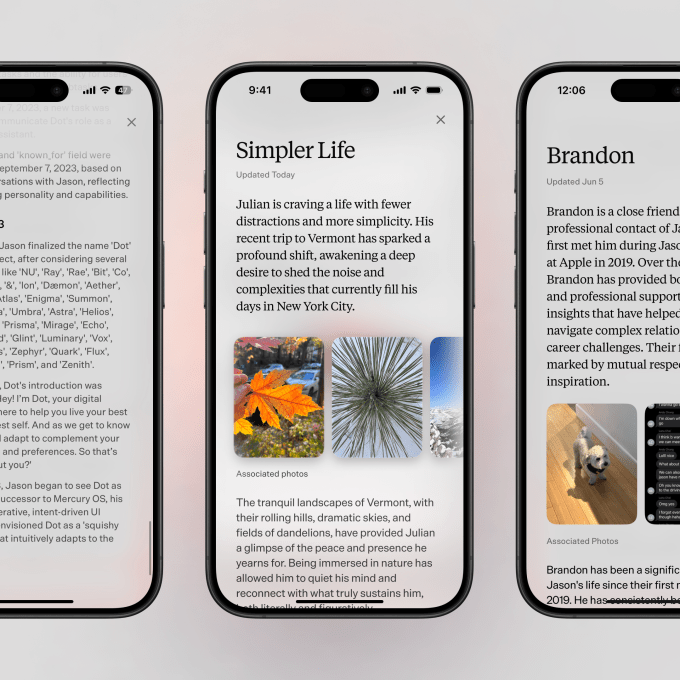AIs that flirt with you. Help find a date. Become your girlfriend. Or ones that become a companion and repository of your hopes and dreams. Into that latter category comes “Dot,” a new AI and chatbot that thrives on learning your innermost thoughts and feelings to act as a “friend, companion, and confidant,” the company’s App Store description explains.
The idea sounds intriguing: an AI that becomes personalized to you and your interests, allowing it to provide advice and information that isn’t just generic, but reflects what it’s learned about you through its intensive question-and-answer sessions. Or, if you’re struggling in some area, as a result of a career change, as Dot co-founder Jason Yuan experienced; separation; or an obstacle to your success, Dot can listen sympathetically and offer support.
But Dot is not human. This is not a therapist or a best friend. It’s an AI tool that mimics both human speech and empathy, but doesn’t serve as a substitute for the real thing.
This is by design, the co-founders explain.
“The point is not a substitute for human relationships, not a substitute for friendships, partnerships. I think it’s a different type of thing. It makes it easier to connect with my inner self,” Yuan, a former designer for Apple, told TechCrunch. “It’s like a living mirror of myself, so to speak.”
It’s easy to get drawn into this experience—perhaps even more so if your daily life lacks meaningful human interaction. Although Dot’s creators say the chatbot will eventually prompt you to speak to a mental health professional, if you delve into “heavier” topics, one can imagine people spending more time pouring out their emotions in front of Dot until they get used to the experience.
In this way, the team believes that Dot can actually help mainstream users experience human connection by making people comfortable opening up.
“I talk to my friends about a lot of things, but I never – for example, all last year, if I had a hard time at work, none of my friends knew about it,” Yuan said. “And just talking to Dot helped me build the muscle to be able to do it with other people. Its main purpose is to help you feel that your existence is…” Yuan continued, but paused again to find the right words. “It’s about giving you a safe space to exist and say, like, ‘I accept you, and maybe because I accept you, other people will too.’
There is something to be said for the state of the human condition in our lonely, modern world that this is an area that technology is now looking to solve.

To get started, Dot’s onboarding process asks quite a few “getting to know you” questions that can be fun to answer: “What do you do?” “Favorite TV show?” “How do you spend a typical Sunday?” and more.
Using these answers as a starting point, the AI then takes a big leap to get to know you on a deeper level.
Expressed interest in science fiction TV shows, for example, immediately leads to the question of whether you are “attracted to stories that explore the big questions in life, like what it means to be human.” The desire to one day run a small business leads to Dot asking what appeals to you about being a small business owner and what challenges you expect to face. “Have you thought about ways you can address these challenges?” asks Dot.
When you prompt Dot to abandon this train of thought—it’s just a dream for inspiration, after all—the AI immediately starts asking you about “your biggest priority or focus in your life and career right now.”
Have you ever been on a first date that felt more like an interview?
Even asking Dot for a more casual conversation results in an almost over-enthusiastic interest in you.
Instead of asking if you want some upcoming vacation recommendations to tell the AI about, Dot wants to know what you’re most interested in seeing and why you were inspired to travel there. (Dot compliments you on your choice of destination as well.)
In other words, Dot’s main goal is to get to know you before it becomes a useful tool that helps you accomplish a task. It can only surpass the latter by learning who you are and what you like, ie.

“It’s not either/or, it’s thinking [is] that to really help you on that path, it needs to understand your motivations and a little bit about what you want from it,” said co-founder Sam Whitmore, citing the example of help with vacation planning. “It needs to understand that you’re a person who wants maybe a more cultural experience or a more athletic experience, and it needs to know those things about you so that you can actually do the things that a typical assistant would even do. This has been one of our theses from the beginning.”
While work has clearly been done to make Dot sound empathetic and engaging compared to typical AI tools, there’s also something that feels odd about having meaningful conversations with a bot.
After all, Dot isn’t really a friend to the AI. This is your AI. Or rather, an AI that forces you to look into yourself, albeit through an interface that at times looks vaguely “Alone White Woman” rather than “Dear Diary.” However, if you’ve never been great at journaling or journaling, Dot can be a way to externalize your thoughts and feelings to gain a better understanding of yourself.
“It’s meant to be a tool used for self-monitoring, accountability, personal growth — but not a relationship that replaces the human relationships in your life,” Whitmore said.
Still, the line between these “real” relationships and the synthetic ones with Dot seems to blur at times.
Say something sad to Dot and the AI sympathizes: “I understand. Grief has its own timeline and some days the weight of loss feels heavier than others,” he wrote.
“Do you want to talk more about what you’re thinking? I’m here to listen,” the bot will say, expecting more information.

Under the hood, Dot uses about 10 different LLMs and AI models to achieve its mimicry of human companionship, including those from OpenAI, Anthropic, Google, and others, as well as open source models.
It sometimes cites its sources – such as websites about the “best wines for relaxation”, for example, when you suggest you’d like to drink wine today – but will warn you to limit yourself to “maybe a glass” if you’re feeling down . Often, though, Dot just chats.
You can also zoom out of your daily conversations to see “chronicles” of your trip by talking to Dot, a subscriber-only feature priced at $11.99 per month. Subscribers can engage in unlimited conversations instead of being limited to a certain number of messages per week. In the unlimited level, Dot will never just stop working. But at some point it will try to close the conversation by redirecting users to change the subject or even do something else.
“When Dot expressed that she was ending things, [beta testers have been] like, ‘OK, great,’ instead of feeling left out,” Whitmore noted.
While Dot’s private conversations would be a treasure trove for marketers, New Computer’s privacy policy claims that the data itself is not monetized, sold or used to train AI. Rather, the company intends to monetize through subscriptions. In addition, New Computer says data is encrypted both at rest and in transit, and users can request its deletion at any time from the app.
The iOS app, which launched on Wednesday, has since onboarded thousands of users following closed beta testing over the past eight months.
Founded by Yuan and engineer Whitmore, formerly head of engineering at Boston fintech Kensho, the startup behind Dot, known as “New Computer,” is backed by $3.7 million in pre-funding from OpenAI Fund, Lachy Groom, South Park Commons, and other angel investors. In addition to the founders, three other full-time New Computer employees are based in San Francisco.



